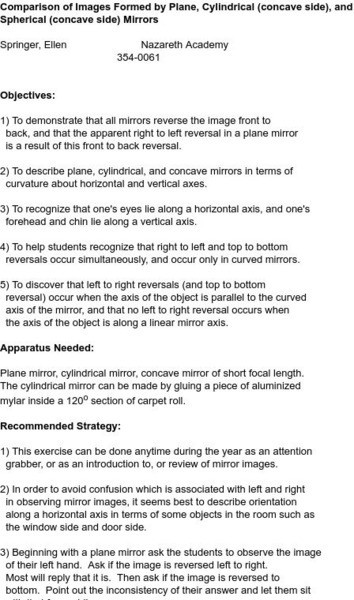Hi, what do you want to do?
Curated OER
Reflections
Students investigate the concept of reflectons. They investigate how an image has a reflection that is symmetrical. They also choose household objects in order to have real life application for finding lines of symmetry.
Curated OER
Body Plans and Adaptations
In this body plans and adaptations worksheet, students will review the different types of symmetry found in organisms. Students will identify body parts as found on either the ventral or dorsal part of an animal. Then students will look...
Curated OER
Folding to Make Shapes
Second graders identify different polygons and their attributes. In this geometry instructional activity, 2nd graders get to know polygons by studying the vocabulary and finding polygons in their classroom. They create these shapes and...
Curated OER
Parabola (Lab Version)
Young scholars develop definition for parabola, explain relationship between properties of the graph of a parabola and its equation, explain how the equation of a parabola can be written in different forms, and solve problems that relate...
Curated OER
Parabola
Students develop a definition of parabola and explain the relationship between the properties of the graph of a parabola and its equation. They explain how the equation of a parabola can be written in different forms and solve problems...
Curated OER
Parabola
Learners complete a worksheet and explore the parabola conic section during a web based activitiy. They answer questions based on their work as they make changes in the features of the parabola.
Physics Classroom
The Physics Classroom: Image Formation for Plane Mirrors
Scroll down to Lesson 2 for a tutorial on image formation in plane mirrors. The tutorial from Glenbrook South High School provides lessons on why and how an image is formed, image characteristics for plane mirrors, ray diagrams, plus more.
Smithsonian Institution
Smithsonian Learning Lab: Turn About's Fair Play! Mirrors and How They Reflect
Teachers can download this teaching package that looks at light and symmetry through the use of mirrors. Students will enjoy the nine mirror challenges, along with the hands-on activities described in the lessons. Teachers will...
Physics Classroom
The Physics Classroom: Reflection and Mirrors: Who Can See Who?
Through investigation, discover the fundamental principle used to explain who can see who in a plane mirror, and why this happens.
Khan Academy
Khan Academy: Objects in the Mirror Are...' Actually Images in the Mirror
This article from Khan Academy provides information about mirrors. This information is intended for the Class 12 Physics Course (India).
CK-12 Foundation
Ck 12: Physical Science: Mirrors
[Free Registration/Login may be required to access all resource tools.] How a mirror forms images and how to distinguish between real and virtual images, and the different types of mirrors and the images they produce.
PBS
Pbs: Horizontal and Vertical Distances on the Cartesian Graph
In this interactive, students use logic and mathematical skill to place aquatic animals at locations on a Cartesian graph with cardinal directions. Then, they determine both the vertical and horizontal distances between points. The...
Physics Classroom
The Physics Classroom: Reflection/ray Model of Light: Mirror Portion Required
A tutorial which demonstrates how ray diagrams can be used to determine what portion of a plane mirror must be used in order to view an image.
CK-12 Foundation
Ck 12 Exploration Series: Simulations: Physics: Prom Night
[Free Registration/Login Required] Understand the Law of Reflection by plane mirrors and the formation of virtual images. Use the simulation to play with variables for a variety of reflections. Further examples explaining how mirrors...
Pennsylvania State University
Penn State Graduate Program in Acoustics: Reflection From Mirrors
Included here are illustrations of reflections from a plane mirror, a concave mirror and a convex mirror.
PBS
Pbs Mathline: Mirror, Mirror Lesson Plan [Pdf]
Determine which regular polygons tessellate by using mirrors. Printable lesson.
Science Education Resource Center at Carleton College
Serc: The Reflection of Light
In this science lab, students work with a partner and complete four investigation activities that experiment with reflection using plane mirrors.
Optical Society
Optical Society of America: Optics for Kids: Mirrors and Images
An experiment to investigate how many images appear as the angle between two hinged mirrors is increased. Accompanied by an explanation of what is happening, questions for students to consider, and a link to an article about reflection.
Science and Mathematics Initiative for Learning Enhancement (SMILE)
Smile: Plane, Concave, Convex Mirrors (Intermediate)
This lesson plan describes a demonstration with mirrors to catch the interest of students. Should be used with intermediate or middle school students.
Physics Aviary
Physics Aviary: The Way a Mirror Works Lab (Plane)
This lab is designed to have students investigate the relationship between the angle of the boards and the angle the puck comes off the boards.
Wolfram Research
Wolfram Math World: Reflection
This site defines reflection, separates reflection into two categories of amphichiral and chiral. The site also gives formulas used in reflective symmetry including point-plane distance, position of reflected points and has links to...
Physics Classroom
The Physics Classroom: Reflection and the Ray Model of Light
A four-lesson tutorial on the reflection and the ray model of light. These complete tutorials include informational text, interactive activities, animations, and quick, interactive comprehension questions.
Exploratorium
Exploratorium: Science Snacks: Your Father's Nose
After constructing a frame with a mirror made of horizontal strips, explore what your face would look like if it was made up of half of someone else's.


















